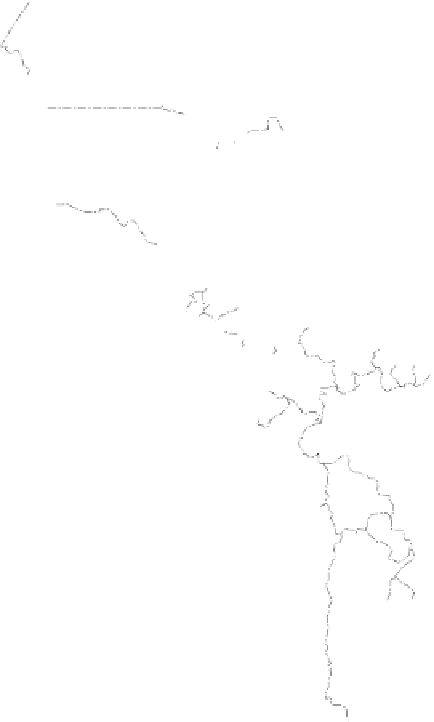Geography Reference
In-Depth Information
GREENLAND
U.S.
(Alaska)
6
0
°
CANADA
40°
40°
UNITED STATES
OF AMERICA
ATLANTIC
BERMUDA
OCEAN
BAHAMAS
MEXICO
Tropic of Cancer
CUBA
DOMINICAN
REPUBLIC
PUERTO
RICO
20°
20°
20°
JAMAICA
BELIZE
U.S.
(Hawaii)
HAITI
DOMINANT COLONIAL INFLUENCES
OVER FOUR CENTURIES, 1550-1950
(including mandates)
HONDURAS
NICARAGUA
GUATEMALA
BARBADOS
TRINIDAD & TOBAGO
EL SALVADOR
PACIFIC
COSTA RICA
PANAMA
VENEZUELA
COLOMBIA
SURINAME
FRENCH GUIANA
Great Britain
GUYANA
Equator
0°
ECUADOR
France
OCEAN
Spain
PERU
BRAZIL
Portugal
BOLIVIA
Netherlands
20°
20°
20°
Tropic of Capricorn
PARAGUAY
Belgium
Italy
ARGENTINA
CHILE
URUGUAY
Turkey
40°
40°
40°
40°
Russia
Japan
Denmark
160°
140°
120°
80°
60°
40°
60°
60°
60°
60°
Not colonized by Europe or Japan
SOUTHERN
OCEAN
0
1000
2000
3000 Kilometers
0
1000
2000 Miles
Figure 8.8
Dominant Colonial Infl uences, 1550-1950.
The map shows the
dominant
European or
Japanese colonial infl uence in each country over the four centuries.
© H. J. de Blij, John Wiley & Sons.
colonialism, Europeans extracted wealth from colonies
and put colonized peoples in a position of subservience.
Of course, not all Europeans profi ted equally from
colonialism. Enormous poverty persisted within the most
powerful European states, and sustaining control over
colonies could be costly. In the late seventeenth century,
Spain had a large colonial empire, but the empire was
economically draining Spain by then. Moreover, west-
ern Europeans were not the only people to profi t from
colonialism. During the period of European colonialism
(1500-1950), Russia and the United States expanded over
land instead of over seas, profi ting from the taking of ter-
ritory and the subjugation of indigenous peoples. Japan
was a regional colonial power, controlling Korea and
other parts of East and Southeast Asia as well as Pacifi c
Islands by colonial means. But the concentration of
wealth that colonialism brought to Europe, and to parts
of the world dominated by European settlers, including
the United States, Canada, and Australia, is at the heart
of the highly uneven global distribution of power that
continues even today.
The forces of colonialism played a key role in knit-
ting together the economies of widely separated areas,
which gave birth to a global economic order called the
world economy. Wealth is unevenly distributed in the
world economy, as can be seen in statistics on per cap-
ita gross national income (GNI): Bangladesh's GNI is
only $1,340, whereas Norway's is $53,690. But to truly

































































































































































































































































































































































































































